by Hanna Roberts | Jul 23, 2018 | Current Students, Faith Infusion, Student Spotlights, Student Spotlights
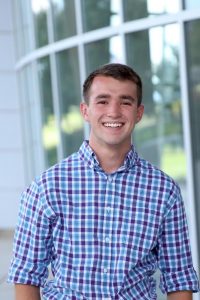
Zach Fetter (’19)
Zach Fetter is a senior with majors in finance and youth ministry from Charlotte, North Carolina. This summer, Zach is an operations intern at Hill Country Bible Church in Austin. As the fiscal year starts on September 1st, leaders across the church have been building budgets for their respective ministries. Zach has met with more than fifty leaders to work through and approve their budgets in preparation for the new fiscal year. He is helping build a projection for the church’s giving numbers for the next year and will present those to the executive pastors and elders. Zach is also in charge of implementing new goal software for the staff that will lead to the improved alignment of the church’s goals from top to bottom.
Through these projects, Zach has been able to learn a lot about how the church operates and its responsibility to be faithful stewards of the money that congregants give for ministry. He has also made strong connections with those around him. Zach’s favorite part of his internship so far has been meeting with the leaders for budget reviews. “Sitting down and talking one-on-one with each leader has given me so much experience in learning how the church stewards money,” says Zach “I hope that this knowledge will help me to confidently and strategically lead a church towards fiscal responsibility one day.”
Zach has also had the opportunity to receive feedback in a job that has helped guide how he approaches his day-to-day. Every week, Zach has a one-on-one with his boss, one of the church’s executive pastors. These one-on-one meetings have grown him the most this summer, both spiritually and professionally. In those meetings, Zach is commended for what he has done well but is also guided through areas in which he can improve. Zach has taken the advice very seriously and applies it to his job and life, as he knows this feedback will help him become a better leader of a church someday.
One thing that has struck Zach in his time at Hill Country Bible Church is the wholehearted submission to God that is evident in every staff member and in the church overall. “The one thing that has been crucial to everything I have done in my internship has been a reliance on God,” says Zach. “The way that the leadership of the church relies on faith and prayer is evident.” Zach has learned that the church could not conduct their business as effectively as they do if they did not consistently give up control and wait to see what God will do through their organization. This is a principle that he believes goes beyond Hill Country Bible Church and his internship and is something that he will remember and apply when he returns to Abilene and for the rest of his life.
by M. C. Jennings | Apr 4, 2018 | Academics, COBA Events, Current Students, Faith Infusion, Student Spotlights, Uncategorized
COBA donors, scholarship recipients, Dean’s Council, and faculty and staff gathered on Thursday, March 22nd, at the annual Ruth Allen Griggs Scholarship Luncheon. The luncheon, inspired by the memory of the hospitable Ruth Allen Griggs, seeks to honor the spirit of generosity and to encourage others to give back. Each table was buzzing with discussion as students, donors, and faculty members conversed about their experiences at ACU and why giving is so important.
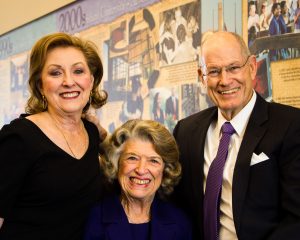
Ann Griggs, Ann Berger Griggs, and Jack Griggs
Students Anna Hornell, junior management major from Fort Worth, TX, and Darius Bell, senior computer science major from Frisco, TX, represented students who have received COBA scholarships, speaking to the audience about what receiving those scholarships has meant to them and the impact that it has had on their education and experiences at ACU.
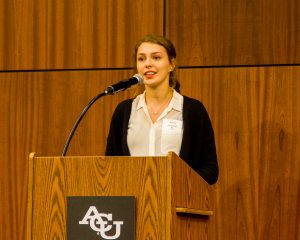
Anna Hornell, junior management major from Fort Worth, TX
Anna said, “The Ruth Allen Griggs Luncheon was such an amazing opportunity for students and donors to meet! It was a time for students to express gratitude to those who allowed them enriching and even life- changing opportunities and to be inspired to generosity both now and in the future. I am hopeful that donors enjoyed connecting with students and hearing about the experiences that they have blessed them with.”
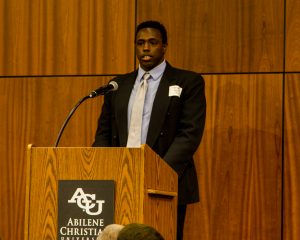
Darius Bell, senior computer science major from Frisco, TX
Darius said, “Giving back creates a thread that binds us all together. Although it is not always easy or convenient, it gives birth to community, community gives birth to a culture, and a culture gives birth to a lasting hope. Receiving this scholarship from the College of Business Administration revealed to me that ACU’s mission and vision extends past the plaques the name is written on and actually lives within the hearts and lives of the donors.”
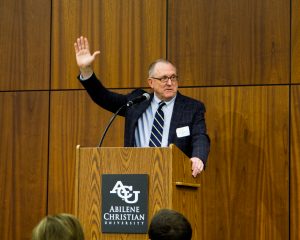
Gary Skidmore, guest speaker, talks about the importance of giving
Gary Skidmore, Chairman of Aberdeen, member of the COBA Dean’s Council, and former ACU Board Trustee spoke to the crowd, relaying a story Dr. Condoleezza Rice tells about her grandfather. “She said that when her grandfather went to college, he paid for his first year in cotton. His sophomore year, he was asked how he would pay for school and he said, ‘I am out of cotton,’ so they said, ‘You are out of luck.’ He asked how the other boys were going to pay. They said, ‘They have what is called a scholarship and if you wanted to be a Presbyterian minister, you could have a scholarship, too.’ My grandfather said, ‘That is exactly what I had in mind.’ Dr. Rice stated that ‘My family has been Presbyterian and college educated ever since. That access to education changed everything. Not just for him, but for generations to come.” Skidmore noted that because of her family’s legacy of education, Condoleezza Rice has gone on to become both a Professor and Provost at Stanford University, National Security Advisor, and Secretary of State. He went on to say, “We’ve all likely received some sort of scholarship” citing statistics that 75% of all college students receive some sort of financial aid and that scholarships are one way we model what Jesus taught us as Christians – to help others. He stated, “We don’t know what will happen if someone is enabled to attend ACU…how their life will be changed. I know I don’t want to learn someday, if only someone had given, cancer would have been cured. In giving, both the giver and the receiver benefit.”
Dean Brad Crisp summed the event up by saying, “The Griggs Luncheon is a favorite event of mine because of the way it reflects and underscores our values. As COBA updates our guiding statements to describe our deeply held values, we are emphasizing how our Christian faith leads us to gratitude and generosity. This event allows our students to express their gratitude for the generosity of our donors.”
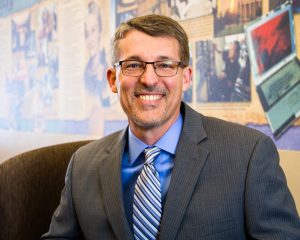
Dr. Brad Crisp
by Hanna Roberts | Apr 2, 2018 | Academics, Current Students, Faith Infusion, Marketing, Poverty and Development, Student Spotlights, Student Spotlights, Uncategorized
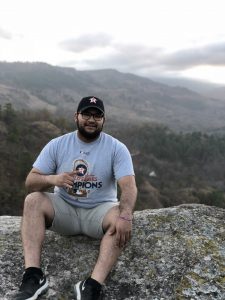
Caleb Casas, junior management and marketing major from Houston, TX.
Over spring break, the Griggs Center and Halbert Institute partnered to send a group of students led by Dodd Roberts with Dr. Sarah Easter to Honduras. The group collaborated with Mission Lazarus to work within the communities on a service trip. Caleb Casas, a junior marketing and management major from Houston, was one of the students who went and served. Part of the trip entailed meeting with small business owners to help them with current endeavors and to develop new business ideas. Led by Dr. Sarah Easter and Erika Teilmann, a junior management major from Houston, the group of students met for several weeks before their departure to learn about the business climate of the communities they would be working amidst in Honduras. They researched the businesses, resource availability, education levels, income levels, and more. The group kept it a priority to remember that they were not the experts and that they need to trust the people that actually live and work with people in those communities, the people that understand the everyday circumstances, to determine the feasibility of an idea. The students were challenged to read Philippians 2:1-8 before going into the communities to prepare a servant heart within themselves and to learn of and how to imitate Christ’s humility.
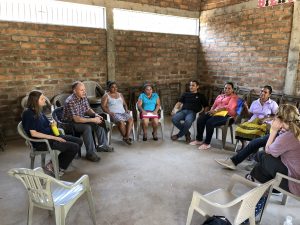 Caleb and the other students met with locals in Namasigue and Cedeño, villages in Honduras, to help build existing businesses and develop new ideas. The people talked about how they would use their businesses to help out the community: to make it possible for everyone to have a little money to buy from one another, to send kids to school, to give to the church, to employ others, and more. In the Namasigue village, all of the businesses are tied together. If only a few people operate a business, then the rest of the village would be unable to purchase from them and would force business owners to sell to ‘coyotes,’ people from bigger cities who come to purchase products in the villages at an extremely low price. It seemed to Caleb that the people had an excellent grasp of how to operate a business in the village but desired feedback on their ideas. They taught the villagers basic accounting so that they could better run their businesses by keeping accurate records, financial statements, and balancing the cost of the business. Both the students and the villagers were able to learn a lot from each other. For example, they met with a woman who planned to sell pigs and wanted to start off with ten. The group encouraged her to start off with three and to buy three pigs every few months so that she had a cycle of product and a steady stream of income instead of trying to sell all of her pigs at the same time. The group suggested that she purchase a male and female to begin breeding so that she wouldn’t have to buy pigs to resell but the women explained that the time and money it takes to breed with the resources available to her was too great for her to ever make a profit.
Caleb and the other students met with locals in Namasigue and Cedeño, villages in Honduras, to help build existing businesses and develop new ideas. The people talked about how they would use their businesses to help out the community: to make it possible for everyone to have a little money to buy from one another, to send kids to school, to give to the church, to employ others, and more. In the Namasigue village, all of the businesses are tied together. If only a few people operate a business, then the rest of the village would be unable to purchase from them and would force business owners to sell to ‘coyotes,’ people from bigger cities who come to purchase products in the villages at an extremely low price. It seemed to Caleb that the people had an excellent grasp of how to operate a business in the village but desired feedback on their ideas. They taught the villagers basic accounting so that they could better run their businesses by keeping accurate records, financial statements, and balancing the cost of the business. Both the students and the villagers were able to learn a lot from each other. For example, they met with a woman who planned to sell pigs and wanted to start off with ten. The group encouraged her to start off with three and to buy three pigs every few months so that she had a cycle of product and a steady stream of income instead of trying to sell all of her pigs at the same time. The group suggested that she purchase a male and female to begin breeding so that she wouldn’t have to buy pigs to resell but the women explained that the time and money it takes to breed with the resources available to her was too great for her to ever make a profit.
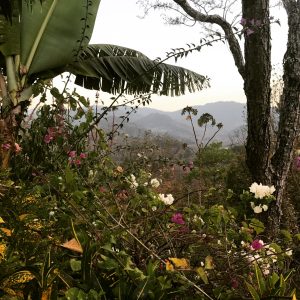 The students also built latrines in the villages as a part of Mission Lazarus’ public health campaigns that aim to engage the community through health promotion and prevention and share essential health teachings with families and communities. The latrines were a tremendous step in both sanitation and privacy for families in the communities. Caleb was struck by how something as small as a latch on a bathroom door gave people basic human dignity. “In America, we don’t have to ever worry about finding a private bathroom to use no matter where we go,” said Caleb. “But the simple act of installing a two-dollar latch allowed these people to go about their business in private and gave them dignity. There was a man who had gone over eighty years without a private bathroom and I was struck by how often I take something like a toilet for granted.” Caleb was also moved by the Hondurans’ gratitude and willingness to work. “They didn’t want us to do the work for them but wanted to work alongside us,” he noted. For the families to even receive a latrine, they had to dig the hole themselves before people would come install the physical latrine. For some people, this meant digging a twelve-foot hole with nothing but a shovel and a chisel. One man chiseled through two feet of solid rock alone. Even though they had done all of this back-breaking work to lay the foundation for the latrines, when the students came to install them, the villagers worked alongside them, helping mix and lay concrete, drilling, and installing the roof. After they had finished installing one of the latrines, a man came and gave them mangoes, which was all he had to give. Caleb was amazed that the people were so grateful that they were willing to give up all that they had to say thank you to the students.
The students also built latrines in the villages as a part of Mission Lazarus’ public health campaigns that aim to engage the community through health promotion and prevention and share essential health teachings with families and communities. The latrines were a tremendous step in both sanitation and privacy for families in the communities. Caleb was struck by how something as small as a latch on a bathroom door gave people basic human dignity. “In America, we don’t have to ever worry about finding a private bathroom to use no matter where we go,” said Caleb. “But the simple act of installing a two-dollar latch allowed these people to go about their business in private and gave them dignity. There was a man who had gone over eighty years without a private bathroom and I was struck by how often I take something like a toilet for granted.” Caleb was also moved by the Hondurans’ gratitude and willingness to work. “They didn’t want us to do the work for them but wanted to work alongside us,” he noted. For the families to even receive a latrine, they had to dig the hole themselves before people would come install the physical latrine. For some people, this meant digging a twelve-foot hole with nothing but a shovel and a chisel. One man chiseled through two feet of solid rock alone. Even though they had done all of this back-breaking work to lay the foundation for the latrines, when the students came to install them, the villagers worked alongside them, helping mix and lay concrete, drilling, and installing the roof. After they had finished installing one of the latrines, a man came and gave them mangoes, which was all he had to give. Caleb was amazed that the people were so grateful that they were willing to give up all that they had to say thank you to the students.
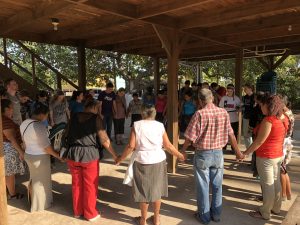 In Honduras, Caleb experienced and was impacted by was God’s purpose and design in bringing us to a specific time and place. Caleb’s grandfather was a pastor in Mexico but came to the US to start a Spanish-speaking congregation within Bammel Church in Houston. Caleb remembered hearing stories about his grandma growing up in Saltillo – no running water, an outhouse that was a mile away, playing soccer with rocks – and realized that, if it had not been for his grandfather saying “yes” to the Lord and leaving his work in Mexico, Caleb could have been in a similar situation to the people he was serving in Honduras. “I was serving what could have been my grandpa,” Caleb realized. “Maybe in three generations, like my family, those people could be in America or helping grow Honduras. You never know what impact you or God will have on people and their life trajectory.”
In Honduras, Caleb experienced and was impacted by was God’s purpose and design in bringing us to a specific time and place. Caleb’s grandfather was a pastor in Mexico but came to the US to start a Spanish-speaking congregation within Bammel Church in Houston. Caleb remembered hearing stories about his grandma growing up in Saltillo – no running water, an outhouse that was a mile away, playing soccer with rocks – and realized that, if it had not been for his grandfather saying “yes” to the Lord and leaving his work in Mexico, Caleb could have been in a similar situation to the people he was serving in Honduras. “I was serving what could have been my grandpa,” Caleb realized. “Maybe in three generations, like my family, those people could be in America or helping grow Honduras. You never know what impact you or God will have on people and their life trajectory.”
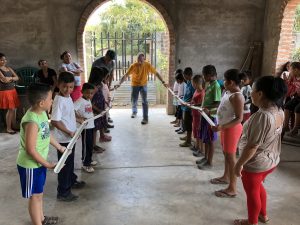 Another surreal moment that Caleb experienced in Honduras was meeting Luis, the preacher of the Honduran church the group was working with. Luis was born in Honduras but moved to the US and actually attended Caleb’s Bammel. Bammel Church sponsored Luis to attend the Baxter Institute, a seminary school in Guatemala. Caleb’s grandfather also taught classes at Baxter during Luis’ time there. Once Luis graduated, he had twenty-three churches where he could have served but felt a calling to go to Namasigue. Caleb was amazed at how God brought them together and connected them at this specific time and place where they were both serving together. “There were so many points in our lives where things could have happened differently,” Caleb said. “Nonetheless, God intersected our lives and that made an impact on me.”
Another surreal moment that Caleb experienced in Honduras was meeting Luis, the preacher of the Honduran church the group was working with. Luis was born in Honduras but moved to the US and actually attended Caleb’s Bammel. Bammel Church sponsored Luis to attend the Baxter Institute, a seminary school in Guatemala. Caleb’s grandfather also taught classes at Baxter during Luis’ time there. Once Luis graduated, he had twenty-three churches where he could have served but felt a calling to go to Namasigue. Caleb was amazed at how God brought them together and connected them at this specific time and place where they were both serving together. “There were so many points in our lives where things could have happened differently,” Caleb said. “Nonetheless, God intersected our lives and that made an impact on me.”
Caleb was absolutely impacted during his time in Honduras. The opportunity to serve and work alongside the people in Namasigue and Cedeño showed him how God works in incredible and mind-blowing ways and His plan is always good. Caleb looks forward to the potential to return to Honduras soon and is even talking about going back this summer.
by M. C. Jennings | Aug 2, 2017 | Academics, Careers In..., Current Students, Student Spotlights, Student Spotlights, Uncategorized
Brandon Gonzales is a senior Accounting major from Rowlett, Texas. He is interning with Concho Resources this summer.
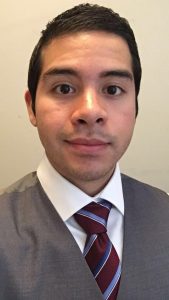
Brandon Gonzales
Q: What have you done in your internship so far?
I am currently interning at Concho Resources which is an oil and gas E&P company based in Midland, Texas. As an accounting intern, I was placed in the revenue department where I was assigned a summer project that I worked on throughout the internship. My project was to perform a self-audit of the severance taxes for oil and gas that Concho paid for its New Mexico wells. If you intern at Concho, you will be assigned a major project associated with the department you are placed in at the start of the summer. At the conclusion of the internship, you will lead a presentation over the results of your project to the upper-management of the company. Due to its importance, my first month of the summer was solely dedicated to working closely with my mentor on this project. This is because each project is over an issue that Concho has an interest in and a majority of the work done by the interns are put to use by the company. For example, the workbook that I created for my project can be directly adapted for future use by the revenue department in performing audits for years outside of the scope I was assigned. After the first month, I was rotated for the remainder of the summer among other departments and groups so I could get more exposure to accounting in the company. I moved to another floor and started working alongside the Director of Accounting and a senior accountant where I helped analyze reserve reports that we received over our properties. My main job on that project was to identify and represent key information that they wanted to review in a future meeting. I created a number of pivot tables and other charts compiled from the data in reports. After a few days, I was moved once again and began working in the Joint-Interest Billing department. There I performed another audit, but this time it was over joint operating agreements that we had from previous years. I was tasked with researching each agreement to determine if we were correctly paying what the contract stated by comparing what we had in our records. Currently, I am still in the JIB department, but am now working with another group to review unbilled properties and the accompanying invoices to determine if they are correctly billed in the revenue system we use.
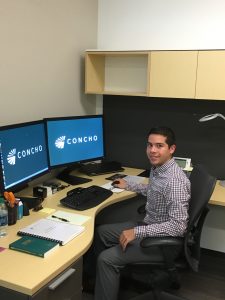
Q: What has been your favorite part of the internship?
My favorite part of the internship so far must be how involved Concho is in making sure the intern class is enjoying the summer in Midland. They want to be sure that we come away from this internship with positive memories of not only the company, but the city as well. There were multiple events throughout the summer that Concho orchestrated for the interns to get together and everything was always paid for by the company. From minor league baseball games in the company’s private box suite to golfing at the country club. They even sent us to Midland’s Petroleum Museum for a day of training so the interns could get a better sense of the oil and gas industry. The coolest event being a field trip out to one of the oil rigs where we received a personal tour from one of the supervisors. Concho also provided summer housing for the interns which really helped in bringing everyone together since we all literally lived doors down from each other. Even when there was not a company sponsored event, the interns usually had something planned like a cookout at the apartment pool.
Q: How do you see this experience aiding you in the future?
Going into this internship, I knew nothing about the oil and gas industry including how accounting was done for E&P companies. However, I was never given any busy work this summer. All the projects I worked on were assignments that would be given to the regular staff and provided an actual benefit to the company. Being treated as another new-hire was worthwhile and the knowledge that I gained can easily be leveraged in the future if I decide to pursue a career in the industry. Getting to know the people I worked with was one of the biggest benefits that I gained from this internship. I’ve built relationships with multiple people over the summer who gave me guidance not only in my career, but life as well. In particular, one coworker welcomed me into her church and got me connected with the youth group she ran. Even if I never work at Concho or in the oil and gas industry, building relationships with more experienced people in the field was a great experience.

Q: What has grown you as an individual the most in this internship?
I’ve always been the type of person who likes to figure out solutions to problems I come across on my own. With this internship, I had to learn to be more proactive in asking for assistance from not only those who I worked directly with, but others within the company. I knew almost nothing whenever I started a new project and at times that was daunting. Repeatedly needing to ask for further explanations was something that I was uncomfortable with because I didn’t want to be a bother. Over time, I came to realize that being given more responsibilities didn’t mean that I had to bear everything alone. Looking around the office, I noticed that it was common to see people collaborating on their work. Although people had separate responsibilities, we were all part of the same team. This environment helped me get used to working as a part of a larger team and not be afraid to ask for further clarification on what I was doing. People welcomed questions because they wanted to make sure I understood not only how something was done, but the why as well.
Q: Do you have any tips for others?
Audit or Tax? Big 4 or mid-tier firm? These are common questions that accounting majors come across at some point in undergrad. Some students find their own answer within weeks, while others are unsure up until graduation. However, when it comes to starting their career, I think that many accounting students are too quick to dismiss starting out their career in an industry role. Going into public accounting straight out of college is seen as the traditional route with securing a great job in industry after years of experience as the end goal. I think this is due in large part to the fact that many of the companies that recruit on campus are public firms. There is little exposure to any other option before graduation. This summer, many of the staff that I worked alongside did do not come from public backgrounds and I was curious as to why. I received various answers, but the most common was that the long-term goals they had for themselves were perfectly attainable without going into public accounting. The main takeaway being that both routes have their pros and cons so it is up to the individual to decide which path is best for them. I would encourage younger students to equally give both options their attention as they go through college. Choosing to dismiss one side without the proper due diligence is simply closing off a number of future opportunities.
by M. C. Jennings | Jul 12, 2017 | Academics, Careers In..., Current Students, Student Spotlights, Student Spotlights, Uncategorized
Leah Montgomery is a senior Marketing/Management double major from Abilene, Texas. This summer, Leah is interning with PFSweb.
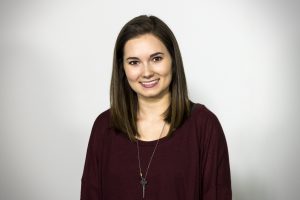
Leah has a marketing internship this summer with PFSweb, a leading global eCommerce solutions provider.
Q: What have you done in your internship so far?
A: The main two tasks I have been working on so far are the planning of a company event and writing a blog. Along with this I help the marketing team with any projects they are working on.
Q: What has been your favorite part of the internship?
A: I’ve really enjoyed seeing the process different projects have to go through before completion. Many events and publications seem very simple from the outside but on the creation side the complexity is impressive. By watching how a team can work together to get a job done shows how important every detail is.
Q: How do you see this experience aiding you in the future?
A: This internship has shown me how important group projects are. I know, everyone dislikes group projects but that is what we should expect after we graduate: never ending group projects. They are obviously different than in classes but the aspect of working as a team to achieve the same goal is the same.
Q: What has grown you as an individual the most in this internship?
A: Writing the blog has been the most challenging. I have never written a blog before, and haven’t needed to write a paper in college for over a year. Trying to make a topic in eCommerce exciting and worth reading was difficult. The original draft looks nothing like what is published, but with the help of a team of great writers I was able to get advice and edits that helped me understand more of what was expected and how I can improve and do better next time.
Q: Do you have any tips for others?
A: If Jennifer Golden ever teaches digital marketing ever again TAKE IT. That is the most obvious example of a class that I could pull information from directly and place it into my internship. Even as simple as knowing terms and understanding more about eCommerce so I could join conversations and understand what was being discussed. By knowing the information taught in that class I had more confidence going into my internship and feeling more prepared. Great class.
Check out Leah’s blog post for PFSweb here.
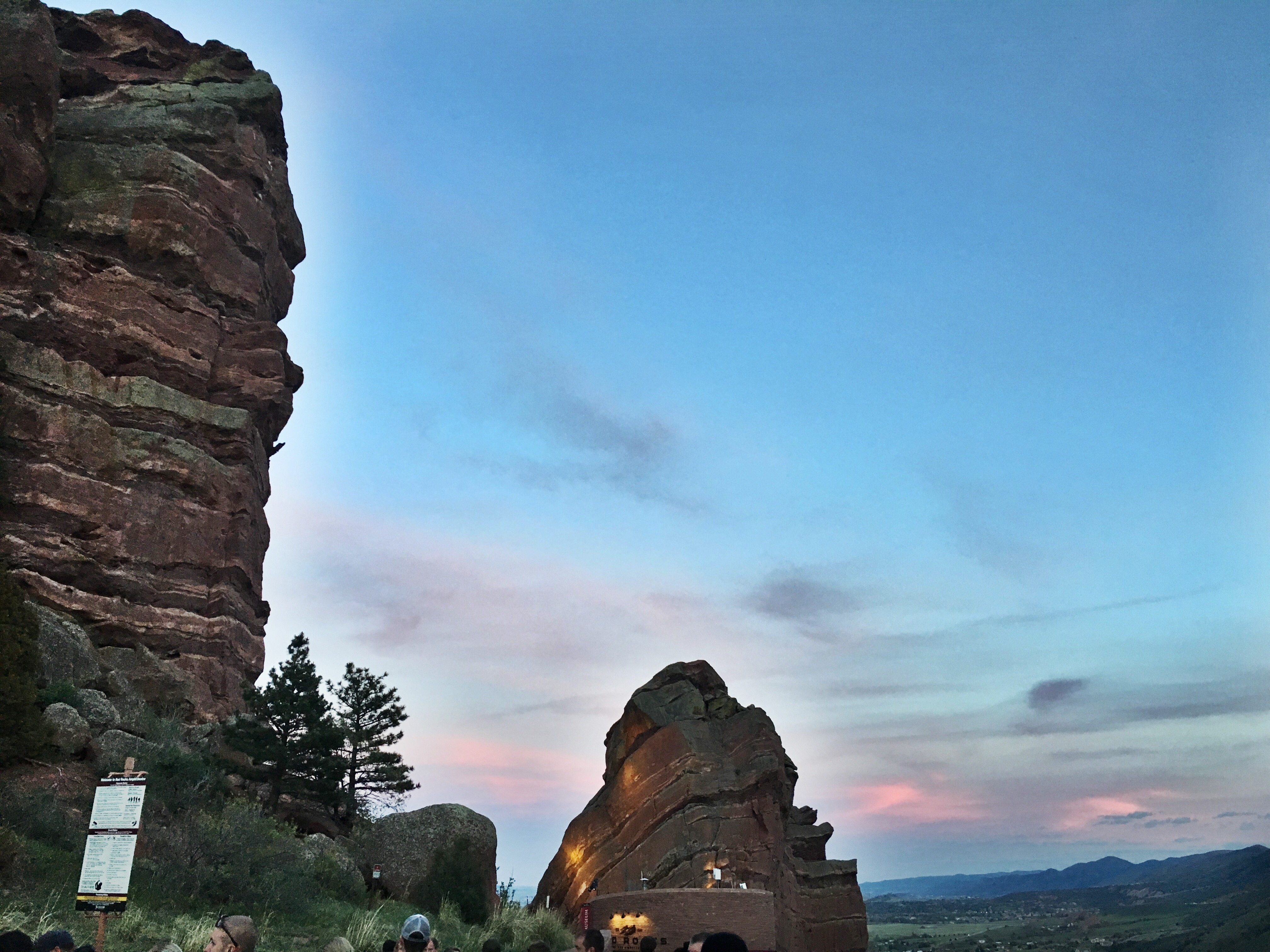
by Hanna Roberts | Jun 14, 2017 | Academics, Current Students, Marketing, Student Spotlights, Student Spotlights

Kate Hegi, senior, has had the amazing opportunity to intern in Denver working on the marketing side of the music industry with Denver Arts and Venues.
Kate Hegi is a senior marketing student from Fort Worth, TX. This summer Kate is interning with Denver Arts and Venues, specifically working with Red Rocks Amphitheatre.
Q: What have you done in your internship as of yet?
A: I mainly work with the sponsorship aspect of the venue. I help our sponsors activate with the concerts or events each night. So far, I have gotten to work with Coca-Cola, Chipotle, Clifbar, and many more sponsors. I also work on the ticketing process for the venues, sponsorship contracts, social media strategies and contests, and overall marketing plans for the summer.
Q: What has been your favorite part?
A: My favorite part is so hard to pick! Every time I work a concert, I say “okay, tonight is my favorite night.” Red Rocks is such a beautiful place. Being able to be outside and to bask in God’s creation almost every night is not a bad gig, to say the least.
Q: How do you see this experience aiding you in the future?
A: This experience has helped me in so many different ways. First and foremost, this job has really taught me more about sponsors, marketing, social media, and business contract law. Learning about these has been so beneficial. It has exposed me to different types of people and how to work with those types, whether that is based on age, experience, or personality.
Q: What has grown you as an individual the most in this internship?
A: Personally, the experience that has shaped me the most is simply living in a new state by myself. To be in a new place all by yourself can be intimidating and I would be lying if I said it was not hard at times. But overall it has been such a good way to really find myself and learn how to live in the real world. It’s been great!
Q: Do you have any tips for others?
A: Apply everywhere, no matter if you think it is too ‘far fetched’ or not! I never would have thought in a million years that I would actually get this internship, yet here I am, five weeks into it. Challenge yourself and I promise it will be worth it!





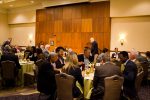




 Caleb and the other students met with locals in Namasigue and Cedeño, villages in Honduras, to help build existing businesses and develop new ideas. The people talked about how they would use their businesses to help out the community: to make it possible for everyone to have a little money to buy from one another, to send kids to school, to give to the church, to employ others, and more. In the Namasigue village, all of the businesses are tied together. If only a few people operate a business, then the rest of the village would be unable to purchase from them and would force business owners to sell to ‘coyotes,’ people from bigger cities who come to purchase products in the villages at an extremely low price. It seemed to Caleb that the people had an excellent grasp of how to operate a business in the village but desired feedback on their ideas. They taught the villagers basic accounting so that they could better run their businesses by keeping accurate records, financial statements, and balancing the cost of the business. Both the students and the villagers were able to learn a lot from each other. For example, they met with a woman who planned to sell pigs and wanted to start off with ten. The group encouraged her to start off with three and to buy three pigs every few months so that she had a cycle of product and a steady stream of income instead of trying to sell all of her pigs at the same time. The group suggested that she purchase a male and female to begin breeding so that she wouldn’t have to buy pigs to resell but the women explained that the time and money it takes to breed with the resources available to her was too great for her to ever make a profit.
Caleb and the other students met with locals in Namasigue and Cedeño, villages in Honduras, to help build existing businesses and develop new ideas. The people talked about how they would use their businesses to help out the community: to make it possible for everyone to have a little money to buy from one another, to send kids to school, to give to the church, to employ others, and more. In the Namasigue village, all of the businesses are tied together. If only a few people operate a business, then the rest of the village would be unable to purchase from them and would force business owners to sell to ‘coyotes,’ people from bigger cities who come to purchase products in the villages at an extremely low price. It seemed to Caleb that the people had an excellent grasp of how to operate a business in the village but desired feedback on their ideas. They taught the villagers basic accounting so that they could better run their businesses by keeping accurate records, financial statements, and balancing the cost of the business. Both the students and the villagers were able to learn a lot from each other. For example, they met with a woman who planned to sell pigs and wanted to start off with ten. The group encouraged her to start off with three and to buy three pigs every few months so that she had a cycle of product and a steady stream of income instead of trying to sell all of her pigs at the same time. The group suggested that she purchase a male and female to begin breeding so that she wouldn’t have to buy pigs to resell but the women explained that the time and money it takes to breed with the resources available to her was too great for her to ever make a profit. The students also built latrines in the villages as a part of Mission Lazarus’
The students also built latrines in the villages as a part of Mission Lazarus’  In Honduras, Caleb experienced and was impacted by was God’s purpose and design in bringing us to a specific time and place. Caleb’s grandfather was a pastor in Mexico but came to the US to start a Spanish-speaking congregation within
In Honduras, Caleb experienced and was impacted by was God’s purpose and design in bringing us to a specific time and place. Caleb’s grandfather was a pastor in Mexico but came to the US to start a Spanish-speaking congregation within  Another surreal moment that Caleb experienced in Honduras was meeting Luis, the preacher of the Honduran church the group was working with. Luis was born in Honduras but moved to the US and actually attended Caleb’s Bammel. Bammel Church sponsored Luis to attend the Baxter Institute, a seminary school in Guatemala. Caleb’s grandfather also taught classes at Baxter during Luis’ time there. Once Luis graduated, he had twenty-three churches where he could have served but felt a calling to go to Namasigue. Caleb was amazed at how God brought them together and connected them at this specific time and place where they were both serving together. “There were so many points in our lives where things could have happened differently,” Caleb said. “Nonetheless, God intersected our lives and that made an impact on me.”
Another surreal moment that Caleb experienced in Honduras was meeting Luis, the preacher of the Honduran church the group was working with. Luis was born in Honduras but moved to the US and actually attended Caleb’s Bammel. Bammel Church sponsored Luis to attend the Baxter Institute, a seminary school in Guatemala. Caleb’s grandfather also taught classes at Baxter during Luis’ time there. Once Luis graduated, he had twenty-three churches where he could have served but felt a calling to go to Namasigue. Caleb was amazed at how God brought them together and connected them at this specific time and place where they were both serving together. “There were so many points in our lives where things could have happened differently,” Caleb said. “Nonetheless, God intersected our lives and that made an impact on me.”







